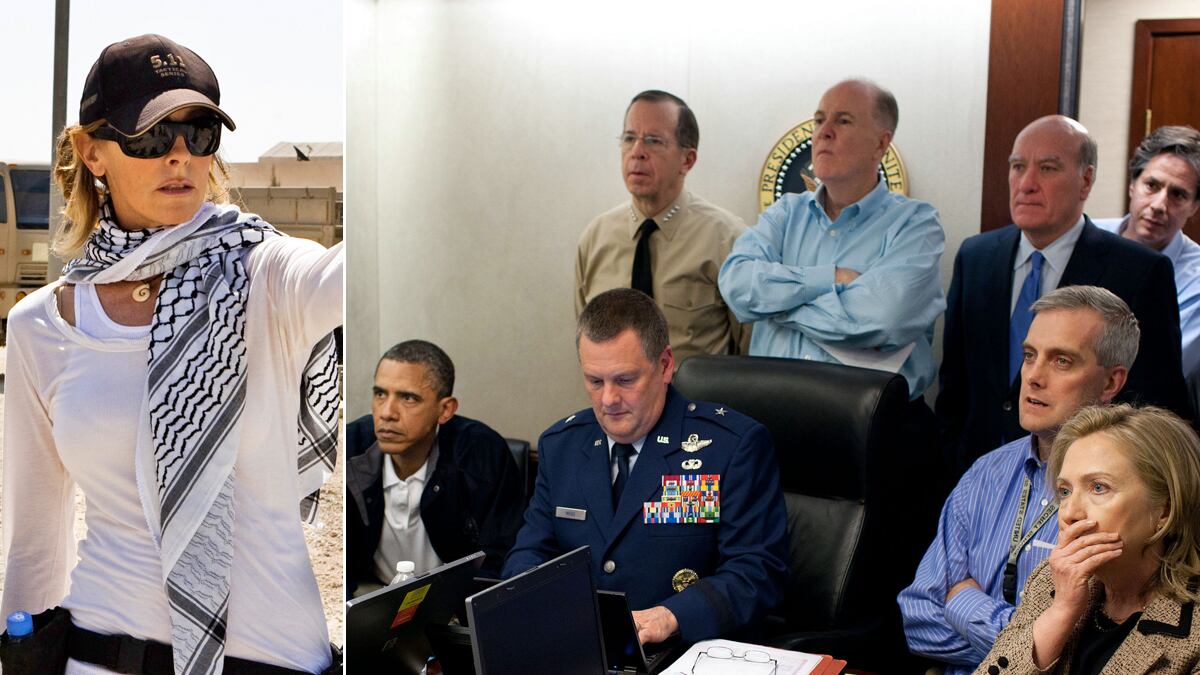Republicans see it as the height of hypocrisy. While Obama administration officials aggressively prosecute leaks to the press, they are opening the door—perhaps even sharing classified details—to the makers of a movie about the killing of Osama bin Laden.
The film will presumably make President Obama look good, and even worse—for Republicans, at least—it is slated to open on Oct. 12, 2012, shortly before the presidential election.
One thing is certain: The president has been ruthless with leaks, going after more people for leaking classified information than all previous presidents combined. During Obama's term, government lawyers have prosecuted five individuals under the Espionage Act of 1917. Administration critics believe these prosecutions are unwarranted, designed only to silence those who are speaking out against “government ineptitude, wrongdoing, and illegality,” says Jesselyn Radack, a director of the Washington-based Government Accountability Project.
The prosecutions have foundered. For instance, Justice Department officials dropped most of the charges against Thomas Drake, a former National Security Agency official who had been accused of leaking classified information about telecommunications and wound up pleading guilty to a misdemeanor.
The president’s hardline approach to people such as Drake—including a subpoena in another case for author James Risen—stands in sharp contrast to the red-carpet treatment shown to filmmaker Kathryn Bigelow. She was granted “top-level access to the most classified mission in history,” as New York Times columnist Maureen Dowd wrote. Peter King, a Republican who heads the House Homeland Security Committee, cited that line in a letter to inspectors-general at the CIA and the Defense Department, demanding an investigation into whether officials have leaked classified material to Bigelow and fellow filmmaker Mark Boal.

As King pointed out, Pentagon and CIA officials have been cozy with the filmmakers; Boal, for example, attended a CIA ceremony for Navy SEAL commandos. In response to a question about the film, CIA spokeswoman Marie Harf emailed me: “As part of our public outreach, this agency—like others in our government—has over the years engaged with writers, documentary filmmakers, movie, and TV producers, and others in the entertainment industry.”
Meanwhile, at the Pentagon, officials are trying to deal with the fallout over the film. “Oh, my goodness, I’m amazed at the furor that has ensued over this,” says Phil Strub, the department’s director of entertainment media. “It’s much ado about nothing.” Indeed, meetings between the filmmakers and Pentagon officials sound more prosaic than threatening, particularly when it comes to national security. They got together on a Friday night, says Strub, and talked a lot about the weather and a little about the film. “They were mostly in a receive mode,” he says.
Strub did learn, however, that Bigelow wants the film to include Tora Bora, the 2001 debacle in which bin Laden slipped out of the grasp of Special Forces in Afghanistan. Yet at this point details about the production remain unclear. He says that if the filmmakers want to use Army helicopters for the movie, “they’ll have to be satisfied with vanilla-flavored Black Hawks,” since, given the ramped-up pace of Special Operations, there are no originals to spare.
To be sure, Bigelow is being treated better now than in the past. Pentagon officials gave her the cold shoulder when she approached them with a proposal for her film The Hurt Locker, which won an Oscar last year. But it is not because of politics, say defense officials. The Hurt Locker was in fact a powerful recruiting tool for the military, since it made bomb-defusing guys look awesome, but Pentagon officials did not like one of the scenes, a “weird, drunken macho thing,” as Strub recalls, and found it to be an unrealistic portrayal of military life.
“If these things happen, they’re court-martial-able offenses,” he says in explaining why Bigelow’s request was rejected. The new film will be more accurate, says Strub, and for that reason the Pentagon agreed to help.
That annoys Republicans. Still, it is hard to make a case that support for Bigelow is fueled solely by a political agenda or that such messaging is exclusive to progressives. Republicans claim to be shocked, shocked at the hypocrisy of the Obama administration, but this kind of thing crosses party lines. For many years White House officials refused to say the name of the secretive Joint Special Operations Command, or JSOC, yet during the Bush presidency they broke their silence. George W. Bush told author Bob Woodward that “JSOC is awesome,” and its work so affected one Defense Intelligence Agency official, Derek Harvey, that he said it gave him “orgasms.”
Back then, a well-connected officer, Lt. Gen. William Caldwell IV, thought it would be good to publicize a JSOC operation that led to the killing of terrorist Abu Musab al-Zarqawi in Iraq in 2006. Caldwell got around the secrecy restrictions by contacting a former West Point classmate, Gen. Stanley McChrystal, who led JSOC, and then pushed his own staff to get “as much declassified as they could,” according to a Kansas City-based alternative newspaper, The Pitch, so they could reveal what JSOC had been doing. Reporters jumped on the story and wrote super-positive accounts.
Obama White House officials are less colorful in their descriptions of JSOC than their predecessors, but they are equally enthusiastic about the operations, particularly the bin Laden killing in Abbottabad, Pakistan. Indeed, as Henry Crumpton, a former CIA officer who has acted as a consultant for Hollywood producers, says, “It is a great story and needs to be told.”
And while administration officials have bragged about Abbottabad, they have kept a monklike silence about the drone strikes in Pakistan. Human-rights advocates and defense analysts say there is no reason to keep them secret: If the strikes are as accurate as White House officials claim, transparency about the operations would defuse criticism that civilians are collateral damage. Equally important, transparency would shed light on why some people in the tribal areas of Pakistan are targeted and others are not. This would make things easier on the locals, since right now they have no idea what the criteria are.
Whether Democratic or Republican, White House officials always want to keep certain things under wraps. “The administration leaks like a sieve, releasing information about the demise of bin Laden that was clearly of the highest order of classification,” says Radack of the Government Accountability Project. Yet at the same time officials have imposed “a clampdown on information” on those who are critical of the government. Detractors see this as a blatant double standard amid the obsessive, crazy secrecy that sometimes takes hold of Washington.






